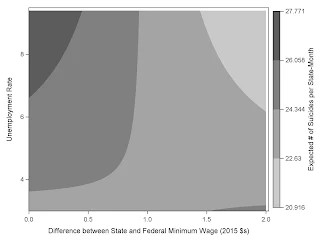"We found a statistically significant interaction between minimum wage
and unemployment (z=−2.48, p=0.013), indicating that the impact of
minimum wage varies across the unemployment rate. The marginal predicted
rates are presented in figure 1.
When unemployment is high (>6.5%), progressively higher minimum
wages are associated with lower suicide rates, while at low unemployment
(3.8%–6.5%) the effect of minimum wage is attenuated, with little
effect observed at very low unemployment (<3.8%)" Source
The news syndicates are full of a paper written by some professors at Emory University.
The sound-bite version of the paper is that raising the minimum wage by a dollar and hour reduces suicide rates by 6.6%. It makes me wonder why we simply don't raise the Federal minimum wage by $15.15 and make death by suicide extinct.
Unlike most of the journalists, I opened the study and read it. It contained some interesting tidbits.
When the average unemployment rate is 7.5%, then the suicide rate is extremely sensitive to increases in minimum wage.
Also, when the unemployment rate is 4.2%, the suicide rate is extremely insensitive to increases in minimum wages.
7.5% and 4.2% were not chosen at random. Those rates are about the average for the Obama and Trump era respectively.
Crosstalk between variables
The study does not attempt to address the relationship between minimum wages and increased unemployment.
Raising the minimum wage can reduce the number of jobs available in the low wages sectors of the economy. It can also result in reduced hours of work made available to low wage workers as the break-even point changes and workers are sent home sooner.
The academic papers are all over the landscape with calculated cause-effect relationships. This one, looking at Seattle's recent increase in minimum wages suggests that raising the minimum wage from $11/hr to $13/hr eliminated 10,000/93,000 low-wage jobs. It should be noted that the Seattle job market was white-hot during this time but the job growth was primarily in highly paid tech sector.
The Seattle paper also points out that workers who don't lose their jobs can still lose money by having their hours cut.
"Point estimates of elasticities imply that, within Seattle,low-wage workers lost $3 from lost employment opportunities for every $1 they gain due to higher hourly wages."
I applaud the first paper cited for attempting to assess how durable the effects of increasing minimum wages were vis-a-vis suicide rates. However, I don't know if one year is the best lag time to assess. Businesses don't always go out-of-business within 365 days of unfavorable legislation being passed.
The take-home is that the relationship between minimum wages and suicide rates is more complicated (confounded, if you prefer) than the main-stream media reports.
Bonus graphic
The original paper makes no attempt to explain the anomaly in the lower, right corner of their graphic. That anomaly, circled in red for your convenience, shows the suicide rate INCREASING at very, very low unemployment rates and increasing minimum wages.




Oh no, you can't use FACTS... you can only use soundbites... You know better... Concur with all.
ReplyDeleteI don't get it.
ReplyDeleteThat is because I suck as a writer.
ReplyDeleteThe authors claim that suicide rates of workers who did not graduate from high school will drop 6% for every $1 increase in the minimum wage.
The newspapers completely missed the point that suicide rates go down for everybody as unemployment rates drop.
Yep, a rising tide lifts all boats.
DeleteI haven't read the article yet, not sure what data they're using, but I wonder if "suicides by workers" means they ignored suicides by long term unemployed? Minimum wage increases would make fewer workers and more long term unemployed.
Also, I gather they are ignoring drug use and drug deaths, which might be reasonably lumped in with suicides.
Looks as if they only examined death certificates of suicides for education level? Did I get that right?
DeleteI notice that all the State minimum wages are endogenous. Exogenous changes would be a bit rarer, but also much more informative. If the Federal minimum wage rose above the state level, and that produced a change in the suicide rate, that would be interesting.